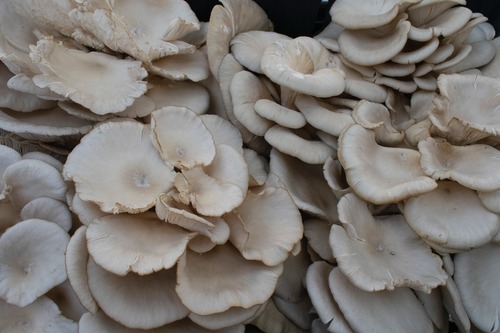INTRODUCTION
In recent years, the world has witnessed a remarkable surge in the popularity of plant-based diets. As more people embrace vegetarian and vegan lifestyles, the quest for protein-rich, meat alternatives has intensified. Among these alternatives, oyster mushrooms have emerged as a true vegan protein powerhouse. In this article, we will explore the nutritional benefits, versatility, and sustainable qualities of oyster mushrooms, making them an excellent addition to any plant-based diet.

The Rise of Plant-Based Diets
The shift towards plant-based diets is not just a trend but a conscious choice made by individuals who are not only looking out for their health but also the planet. Oyster mushrooms fit seamlessly into this eco-conscious lifestyle.
Nutritional Value of Oyster Mushrooms
High Protein Content
One of the standout features of oyster mushrooms is their impressive protein content. These fungi pack a protein punch, making them an ideal meat substitute for vegans and vegetarians. A 100-gram serving of oyster mushrooms contains approximately 3.3 grams of protein, which is comparable to some meats.
Rich in Nutrients
Oyster mushrooms are not only about protein; they also provide a wide array of essential nutrients. They are a good source of vitamins, particularly vitamin D and B-complex vitamins, as well as minerals like potassium, iron, and phosphorus.
Low in Calories and Fat
For those watching their calorie intake, oyster mushrooms are a fantastic choice. They are low in calories and virtually fat-free, making them an excellent option for weight management and overall health.
Culinary Versatility
A Gourmet Delight
Oyster mushrooms are celebrated for their delightful taste and texture. When properly cooked, they offer a delicate, umami-rich flavor and a slightly chewy texture that is reminiscent of seafood. This makes them a favorite among chefs and food enthusiasts.
Diverse Cooking Options
From stir-fries to soups, oyster mushrooms can be incorporated into a wide range of dishes. They absorb the flavors of the ingredients they are cooked with, making them a versatile ingredient for various cuisines.
Meat Substitute
Thanks to their meaty texture and protein content, oyster mushrooms can stand in for meat in many recipes. Whether you’re making burgers, tacos, or skewers, oyster mushrooms can be a delicious and nutritious substitute.
Sustainable Farming
Low Environmental Impact
Oyster mushrooms are not only nutritious and tasty but also sustainable. They can be grown using agricultural waste products like straw, making them an eco-friendly choice. Their cultivation has a significantly lower environmental footprint compared to traditional livestock farming.
Short Growth Cycle
Oyster mushrooms have a rapid growth cycle, taking only a few weeks to mature. This means that they can be produced in large quantities without the long waiting times associated with livestock farming.
Conclusion
In conclusion, oyster mushrooms are indeed a vegan protein powerhouse. With their impressive nutritional profile, culinary versatility, and sustainable farming practices, they have earned their place in the spotlight of the plant-based diet movement. Whether you’re a committed vegan, a flexitarian, or simply looking to reduce your meat consumption, oyster mushrooms are a delicious and sustainable option to consider.
FAQs
Are oyster mushrooms suitable for people with allergies? Oyster mushrooms are generally well-tolerated, but individuals with mushroom allergies should exercise caution and consult a healthcare professional if unsure.
Can I grow oyster mushrooms at home? Yes, oyster mushrooms can be cultivated at home using mushroom growing kits or DIY methods.
Are oyster mushrooms a good source of fiber? While they are not particularly high in fiber, they do contain some dietary fiber, contributing to overall gut health.
What are the best cooking methods for oyster mushrooms? Oyster mushrooms can be sautéed, grilled, roasted, or used in soups and stews, depending on your culinary preferences.
Where can I buy oyster mushrooms if I don’t want to grow them myself? Oyster mushrooms are readily available in many grocery stores, farmers’ markets, and online retailers.